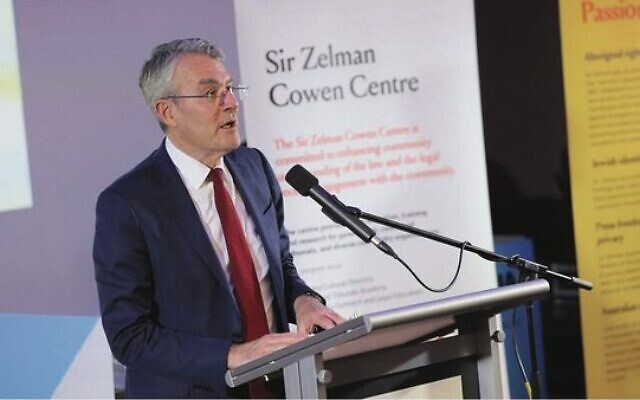Constitutional change ‘hard but necessary’
"Enshrining the Voice in the Constitution would recognise Aboriginal and Torres Strait Islander peoples as the first peoples in Australia in our nation's founding document, for the first time," said Dreyfus.

IN an address to Victoria University’s Sir Zelman Cowen Centre (SZCC), Attorney-General Mark Dreyfus made his case for the Indigenous Voice to Parliament, retracing Sir Zelman’s commitment to constitutional reform.
Delivering the final in a three-part lecture series on Lawyers as Changemakers, Dreyfus noted in his July 27 speech to a capacity audience at the SZCC that the late former governor-general, a celebrated member of the Jewish community, was “a lawyer, scholar, educator and statesman … without peer”.
Sir Zelman, who served in his vice-regal office from 1977 to 1982, had produced the Yes case in Australia’s last successful referendum, noted Dreyfus. The 1967 referendum recognised Aboriginal and Torres Strait Islanders as part of the population.
The Attorney-General rallied lawyers in the audience to take inspiration from Sir Zelman’s trailblazing role by becoming advocates in this year’s Voice referendum.
“Enshrining the Voice in the Constitution would recognise Aboriginal and Torres Strait Islander peoples as the first peoples in Australia in our nation’s founding document, for the first time,” said Dreyfus. “The Voice would complement the existing structures of Australia’s democratic system and enhance the normal functioning of government and the law.
“It would be an independent institution that speaks to the Parliament and the executive government. It would not replace, direct or impede the actions of either. Lawyers have the opportunity to embrace the invitation contained in the Uluru Statement and walk with First Nations people in a movement for a better future.
“In 2009, when speaking about addressing the significant disadvantages faced by Indigenous Australians, Sir Zelman said we have still got some way to go. He was right then. It remains true today,” Dreyfus stated.
Sir Zelman also supported an Australian republic and “advocated for an Australian president chosen by special majority in the Parliament”, Dreyfus recalled. “As we are all aware, the 1999 referendum for a republic was unsuccessful … Constitutional change is hard. Hard, but necessary.”
Dreyfus had been approached earlier this year by SZCC executive director Nyadol Nyuon to take part in the lecture series, whose aim was to “showcase the work of lawyers in their professional career and their contribution to society” and encourage mentorship.
The first two lectures in the series were delivered by William Lye, KC, on the visionary career of William Ah Ket, Australia’s first barrister of Asian heritage, and Ike Nwokolo, a senior lawyer with an African-Australian background, on his pursuit of social justice. The SZCC provides legal education, training, and research with a particular focus on law and cultural diversity.

comments